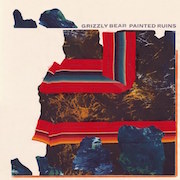Ed Droste, founder and one quarter of Grizzly Bear, recently greeted the notion of Lana Del Rey being an indie rock artist with a resounding “What are you talking about?” A little tightfisted, perhaps, but Droste is nothing if not a musician who has invested a lot into the nebulous realm in question.
Contrary to Dirty Projectors’ David Longstreth and Fleet Foxes’ Robin Pecknold’s idea that it “peaked” in 2009, Droste thinks the idea that indie rock is at an impasse stems from an illusion generated by the same “waves and trends” that give Del Rey the double-edged endorsement of being, you know, legit enough to be worthy of inclusion into the White Indie Dudes club. If the overarching form of indie rock – a term Droste accepts is “silly” in 2017 – does ebb and flow, if not come and go, Grizzly Bear’s latest confirms one categorical fact: if only as a sonic quest, the four-piece have every right to chew over the alleged validity of the genre.
Twelve years on from arriving via Yellow House – Grizzly Bear’s second studio album and first to feature the now indispensable Daniel Rossen of Department Of Eagles on vocals and guitar – Painted Ruins is a finely woven, at times dazzling meditation on disintegration and the necessity of perseverance in the leering face of the unknown. With their signature mix of art rock and chamber pop, these 11 songs capture a quartet who are now fully operating as a unit, having originally begun as an Ed Droste solo project in 2002. Recorded by the band’s bassist and long-time producer Chris Taylor, album number five hits home with a steadfast sense of unity, underscored by a thread of slick compositional intelligence.
Where opener ‘Wasted Acres’ and the balmy, somnambulant sway of six-minute lead single ‘Three Rings’ present a rich wealth of melodic finesse, mid-album highlight ‘Four Cypresses’ – with its rhythmic flourishes and darkly harmonic twists and turns – makes for borderline grandstanding stuff. Elsewhere, the shrewd shifts and almost-imperceptible tonal changes on mid-album peak ‘Aquarian’ capture the band’s knack for exquisite chord changes that reward a keen ear. Woven with sweeping, three and four-part harmonies – not least on second single ‘Mourning Sound’ – Grizzly Bear have once more mined majesty from honouring the craft of the song, not to mention the profound air of mournful wanderlust that is forged when Droste and Rossen bang heads. With drummer Chris Bear – a master of understated Phil Selway-esque flourishes – delivering many moments of brilliance that marry hip hop, prog and afrobeat influence, Grizzly Bear notch up at times to a realm of straight-up virtuosic finesse.
Lyrically, Droste and Rossen veer between thinly veiled allegories of weighty, real-world disquiet and terse, unknowable personal impressions. Where ‘Cut Out’ and ‘Systole’ present some tight-lipped private ruminations and ‘Losing All Sense’ is an example of the band at their most inscrutable, Rossen musing on the sound of “distant shots and passing trucks” on ‘Mourning Sound’, the “workable chaos” of ‘Four Cypresses’ and ‘Aquarian’ are but three examples of the album’s confrontation with imminent ends and crushing blows in an age of severe uncertainty. But with several references to waking up and the morning speckled throughout Painted Ruins, Grizzly Bear quietly offer up the promise of sanctuary despite the spectre of unease lurking just out of shot.
While perhaps coming up slightly short on the nuanced splendor of Shields and the instantaneous élan of its Veckatimest, Painted Ruins is a special kind of conquest. Be it via the unseen sparks that spring forth from heartbreak or the dizzying urges that stem from one too many late-night wrangling with one’s place in the world, this is music stemming from a place that few artists can access. It may or may not be indie rock, but if the question is asked one too many times, the retort must always remain the same: “What are you talking about?”


